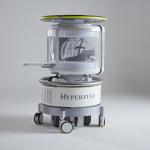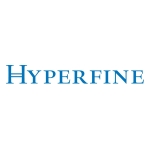Study Published in JAMA Neurology Confirms Low-Field MR Imaging Using Hyperfine’s Swoop™ Portable MRI Successfully Detects Abnormalities at Bedside of Critically-Ill Patients

Single-center prospective study evaluated feasibility of bedside MR neuroimaging in the intensive care settings for 50 critically-ill patients with COVID-19, stroke, hemorrhage, traumatic brain injury and tumors.
GUILFORD, Conn.–(BUSINESS WIRE)–#COVIDNeuroimaging–A recent study published in the Journal of the American Medical Association Neurology demonstrates for the first time the feasibility of Hyperfine’s Swoop™ Portable MRI System to obtain bedside neuroimaging for critically-ill patients in the intensive care unit settings. Researchers tested the feasibility and demonstrated the clinical utility of the Swoop™ system in 50 patients, including COVID-19 patients, to assess brain injury and detect abnormalities. These patients were critically ill and presented challenges for transport to conventional MRI suites in the Radiology Department.
Results from the prospective, observational single-center study, Assessment of Brain Injury Using Portable, Low Field Magnetic Resonance Imaging at the Bedside of Critically Ill Patients, were published on September 8, 2020.
Investigators used the Swoop™ system from October 2019 through May 2020 and successfully detected abnormal neuroimaging findings at the bedside of patients presenting with ischemic stroke, hemorrhagic stroke, subarachnoid hemorrhage, traumatic brain injury, brain tumor and COVID-19 patients with altered mental status.
According to the study’s senior author, Kevin N. Sheth, MD (Yale University School of Medicine, Department of Neurology), the use of traditional MRI units presents accessibility and transportation challenges in the care of critically-ill patients. Furthermore, the highly contagious nature of COVID-19 patients makes bedside MR imaging compelling for infection control protocols.
This study – the first of its kind – demonstrates that deployment of portable MR imaging to patients’ bedsides could fill an important gap for time-sensitive neuroimaging, a cornerstone of triage and treatment pathways.
The study authors conclude, “This experience demonstrates that low-field, portable MRI can be deployed successfully into intensive care settings. This approach may hold promise for portable assessment of neurological injury in other scenarios, including the emergency department, mobile stroke units, and resource-limited environments.”
Magnetic Resonance Imaging uses a magnetic field, radio waves and a computer to produce detailed pictures of the body’s internal structures that are clearer, more detailed and more likely in some instances to identify and accurately characterize disease than other imaging methods. However, fixed MRI systems can be inconvenient and inaccessible for providers and patients, particularly when time is critical. Transport to the MR suite demands complicated scheduling coordination, moving patients, and, often, 4 to 6 hour patient backlogs – all which compromise the utility of MRI as a diagnostic tool in time-sensitive settings such as intensive care units and emergency rooms. Furthermore, high capital investments, electrical power needs and significant maintenance requirements present a barrier to adoption across all populations, acutely so for developing countries and rural geographies.
About the Swoop™ Portable MRI System
Hyperfine’s Swoop™ system was designed to address the limitations of current imaging technologies and make MRI accessible anytime, anywhere, to any patient. Swoop™ wheels directly to the patient’s bedside, plugs into a standard electrical wall outlet, and is controlled by a wireless tablet such as Apple iPad®. Images are captured at the patient’s bedside, with results in minutes, enabling critical decision-making capabilities across a variety of clinical settings including neuro intensive care units, emergency departments, pediatrics, ambulatory outpatient surgery centers and more. The complete Hyperfine system costs less than the annual service contract alone for most current MRI systems, and it consumes 35 times less power than those same systems. Designed as a complementary system to traditional MRIs, new users can be trained on system operation, device navigation and device safety in about 30 minutes, helping clinicians to streamline workflow.
About Hyperfine Research
Hyperfine lives to make MR imaging available to everyone. The Swoop™ Portable MR Imaging System is the result of a total rethink of MR’s potential in the healthcare landscape. What if MR imaging didn’t require a dedicated suite, extensive training or expensive upkeep? Let’s use the wonders of high-field MRI for the appropriate patients, and deploy Swoop™ system at the point-of-care for everyone else. Hyperfine received market-ready FDA clearance for its portable MR imaging for the brain and head of patients of all ages in August 2020. Hyperfine is part of 4Catalyzer, a health technology incubator with facilities in CT, NY, CA and Taiwan. www.hyperfine.io.
Contacts
Chris Ward, cward@hyperfine.io, (203) 905-0412

